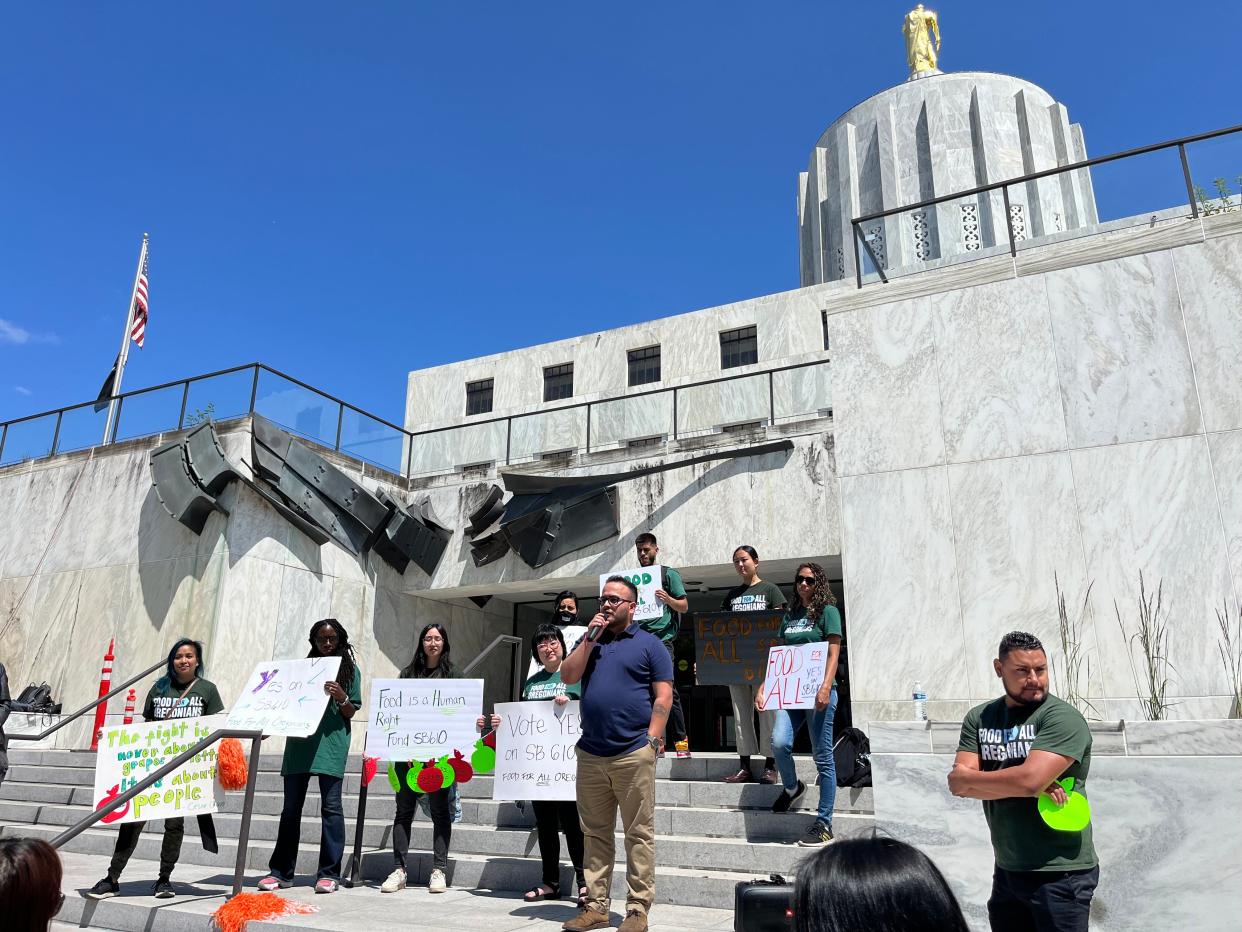Immigrants demand action on legislation to provide 'food for all Oregonians'

Several dozen people in matching green t-shirts gathered in front of the state Capitol Thursday to demand Oregon lawmakers pass Senate Bill 610 out of the Joint Committee on Ways and Means.
The bill, colloquially known as "Food for All Oregonians," would grant food assistance to people who are ineligible for the Supplemental Nutrition Assistance Program (SNAP) due to their immigration status.
It has been stuck in committee while Senate Republicans and one Independent senator continued their now five-week walkout.
"I definitely don't want to take work advice from people who have their feet up at home or who are cowering in their offices because they didn't get their way," policy advocate Angelita Morillo said of Senate Republicans who might vote against the bill because they think people aren't "working hard enough" to deserve nutrition assistance.
In hopes of getting lawmakers to return to work, Senate Democrats voted Thursday to fine absent senators $325 per day for every day a quorum is not reached.
"There are hundreds of bills on the floor that would help Oregonians in countless ways, and they are dying just because some people are having a tantrum in the building and refusing to show up to work to do an essential core function of the job that we elected them to do," Morillo told the crowd.
Struggling to feed their kids
The bill would create a program within the Department of Health and Human Services that would functionally mirror SNAP and be available for people who would qualify for SNAP if not for their immigration status.
Roughly 62,000 people in Oregon fit that profile, according to the Oregon Food Bank.
Those people include lawful permanent residents who have not yet been naturalized or have not been in the country long enough. They also include Deferred Action for Childhood Arrival (DACA) recipients, some refugees and asylum seekers, U.S. Compacts of Free Association (COFA) citizens, and undocumented immigrants.
Morillo said she is the daughter of an immigrant and single mother, and recognizes her mother now in the women she speaks to as a field organizer — people who "have to choose between whether they get to eat, or which kid gets to eat."
"That is completely unacceptable in this country and in any country in the world," Morillo said.
Aldo Solano said he remembers learning about SNAP as a teenager, bringing the news to his immigrant, farmworker parents, and being devastated to learn his family did not qualify because of their immigration status.
"I'll never forget the look in [my mother's] eyes," Solano said. "How was it possible that we were working to provide food on tables for other people, and we couldn't do it for ourselves?"
Rising food insecurity
Food insecurity is expected to increase as pandemic-era assistance programs come to an end. Low-income and people of color will be the most heavily impacted, according to Dr. Hilary Seligman, a professor of medicine at the University of California in San Francisco.
"There's a lot of pressure on people's household food budgets right now, and we expect the result of that is gonna be higher food insecurity," said Seligman, who also serves as senior medical advisor for Feeding America, a national nonprofit food bank network.
About 22% of adults in America reported experiencing food insecurity in the summer of 2022, an increase from about 15% in the spring of 2021, according to a 2022 study. Black and Latino households reported experiencing food insecurity the most.
"We know from historical trends that Black and brown households are going to take a lot longer to recover because of differences in employment opportunities, differences in educational opportunities, and many other factors that tend to hold Black and brown households back from the resources they need to achieve food security," Seligman said.
SB 610 is among the hundreds of bills likely to die if senators fail to reach a quorum soon. Organizers at Thursday's rally said their priority is to pressure senators to pass the bill out of committee. Committees have still been working during the shutdown, and passage there would get the bill closer to a vote of the full Senate if work resumes.
"We have not faced defeat, nor will we," Unite Oregon policy organizer Cynthia Aguilar-Arizmendi said. "We're just getting started."
Shannon Sollitt covers trending and news now for the Statesman Journal. Send tips, questions and comments to ssollitt@statesmanjournal.com
This article originally appeared on Salem Statesman Journal: Immigrants rally to support 'Food for All Oregonians' bill

